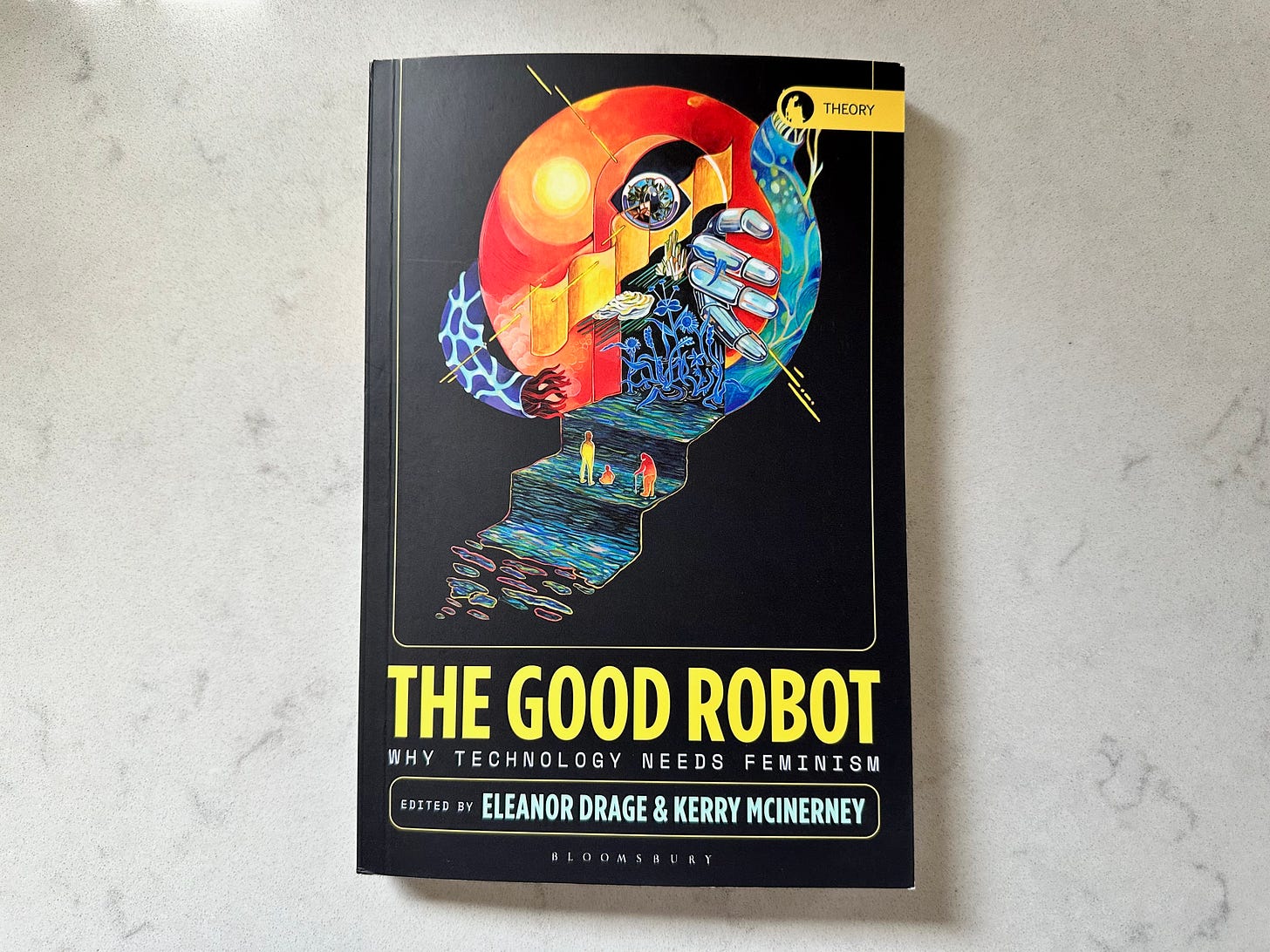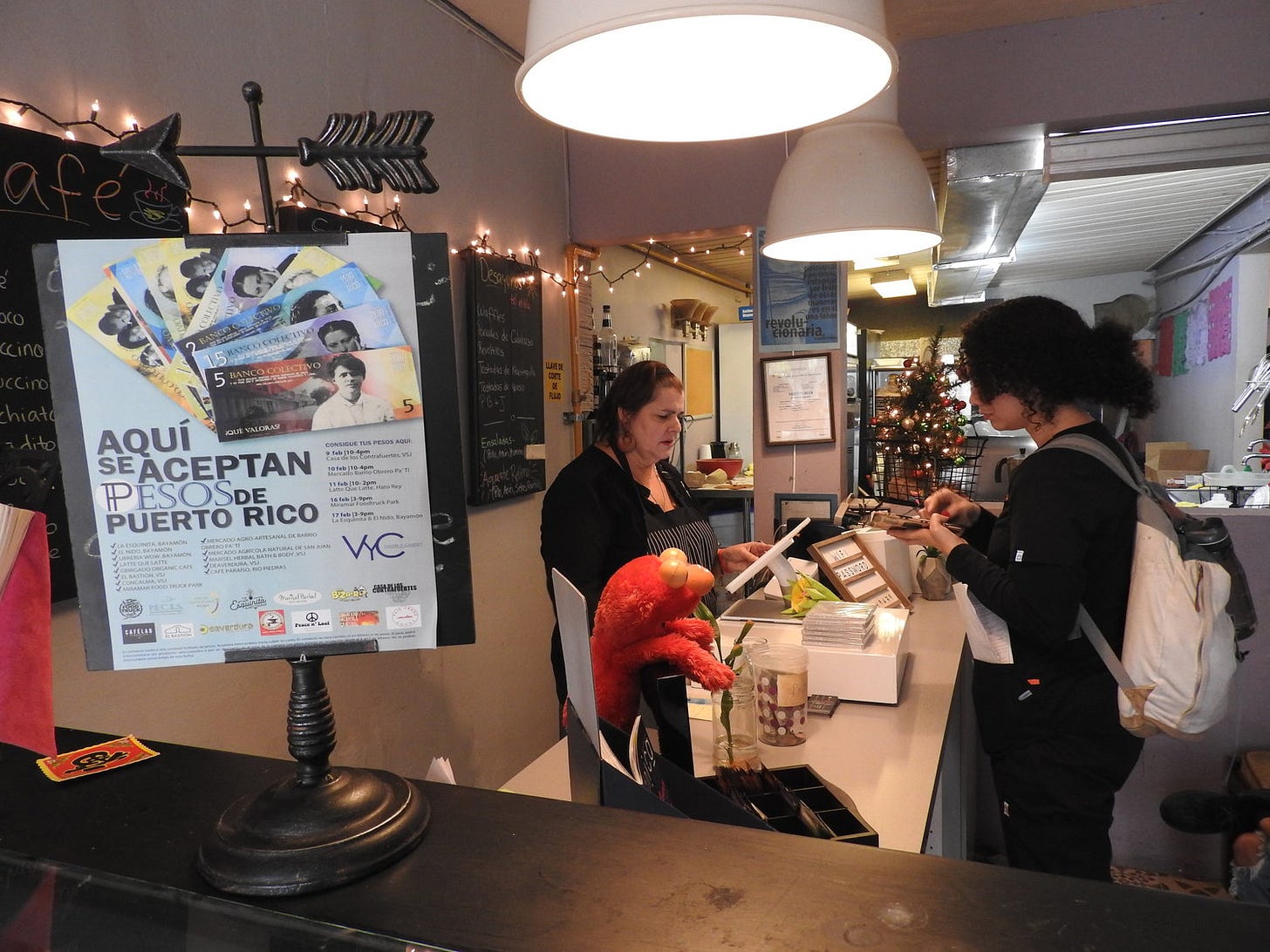Critical feminist thinking on technology that examines power, and imagines non-binary, anti-racist and decolonial futures
🎟️ I will be speaking at UNPARSED — The World's Most Loved Conversational AI conference! My talk “Whose English gets to be default?” will critically examine why accent bias, gender stereotypes and nationality are all problematic factors in automated speech recognition technologies. It’s all taking place in London and online from Monday 17 — Wednesday 19 June.
🇸🇪 Hej Hej Sverige! I am also speaking at The Conference, Malmö which runs from Tuesday 27th — Thursday 29 August. My talk will be on day 2 as part of a session called “Rewilding Us”, where I will speak on imagining futures that decentre humans in design, in dialogue with Black Feminist and Indigenous knowledge traditions.
📚 You can buy any book in this newsletter from my store on Bookshop.org

Since 2021, Dr. Eleanor Drage and Dr. Kerry McInerney, researchers at the Leverhulme Centre for the Future of Intelligence at the University of Cambridge, have presented The Good Robot podcast. In each episode, they invite researchers, artists, and technologists to respond to their central provocation — what is good technology? Discussions have ranged from Feminist App design, Afrofeminist approaches to AI governance, to Why Machine Learning is Political — and that’s just scratching the surface of their archive!
In The Good Robot, both editors give space to previous podcast guests — ranging from Professor N. Katherine Hayles and Dr. Kanta Dihal, to the Chief Ethics Scientist at Hugging Face, Margaret Mitchell and many more. Each writes essays that examine technology through a critical feminist lens.
Feminism is often framed as a social or political concern for women and resistance to patriarchy. From its outset, The Good Robot goes further than this narrow framing to argue for critical feminist thinking as a methodology for challenging power in the technology industry. We are encouraged to challenge entrenched power structures and explore liberatory scholarship in all forms — whether queer, anti-racist or decolonial. The goal is to realise a future where “every piece of technology is built in pursuit of justice” (pg. 3) — regardless of the form these new technologies may take.
Good technology

How do we begin to dismantle centuries of structural exclusion, racist and patriarchal oppression? Each essay in The Good Robot returns us to this central theme by grappling with the question, What is good technology?
The editors have arranged the essays in five sections: Good Relations, Good Systems, Good Design, Good Visions, and Good Rebellions — each containing four to five essays. Writers have also been asked to consider how feminism(s) might guide us to a future where their imagined good technology could exist. From the outset, the editors are clear that their contributors’ feminist approaches should be intersectional and sensitive to the oppressions that have been unequally distributed towards marginalised people.
The Good Robot resonates with me because its ideals are reflected by the lived and research experiences of their contributing writers — each representing varied geographical, cultural and ethnic backgrounds — resulting in a perspective that gives readers a comprehensive view of critical feminist technological thought.
Good essays

I am keen to dwell on three essays in particular:
In Good Relations, Jason Edward Lewis writes “Good Technology Is Messy”. He starts by recognising the entangled nature of the world we inhabit, and the beings with whom we share space. Looking to Indigenous knowledge traditions for inspiration, we are urged to rethink the orthodoxy existing in computational environments. As products of an Anglophone tradition, we make sense of the world in fixed and rigid hierarchies — whether imposed on animals, the environment and, by extension, in the data we create. But what if we take the risk of exploring where other knowledge traditions lead — and in doing so, be introduced to other ways of making sense of the world?
In Good Design, Os Keyes writes “Good Technology Is Vulnerable”. Recent years have seen technology built in thrall to venture capital and a growth-at-all-costs mindset. The values that are aggressively promoted converge on the performance of corporate insensitivity — we see this in how tech companies sacrifice their workers in round after round of layoffs for short-term financial gain; the refusal of Big Tech to acknowledge harms perpetuated by their digital products towards young teenagers, until compelled to do so by Congress. Os Keyes argues for technological vulnerability to be embraced rather than being seen as a sign of weakness. From the Free and Open Source software movement — an “openness to change and changeability” governs the progress of this movement and its willingness to embrace imperfection as a path towards achieving our goals. In contrast to the arrogance of an industry that believes in its ineffable ability to deliver progress, an embrace of vulnerability can be a fulfilling counterbalance.
In Good Rebellions, Frances Negrón-Muntaner writes about the Valor y Cambio project in “Good Technology Is Free (At Least for a Moment)”. ATMs are familiar technologies embedded into the infrastructure of our cities — but what if we could use an ATM to subvert how we socially assign and store value? The Valor y Cambio project sought to do just this by repurposing an old ATM in Puerto Rico to give out free art currency bills when people responded to questions on its screen about what they valued in their community. Each art currency bill told the story of Puerto Rican activists and writers who had lasting effects on improving the lives of their communities. The art currency soon became sought-after objects in and of themselves and was exchangeable for goods and services in local businesses. The project took place against the backdrop of an island nation financially and physically buffeted by twin forces of austerity and storm. In their words, “La máquina helped to assemble people, seed new political possibilities, and generate unexpected concepts and questions” (pg. 185). This essay adds richness to The Good Robot by showing the generative possibilities that technologies surface. The art currency bills show how economic models of value association can be subverted, and these artefacts can open new ways of thinking about how we reclaim agency through our communities.
Good reading
The essays in The Good Robot form a rich tapestry of feminist technological thinking. Each essay is presented in an easy-to-read format — text is split into navigable sub-sections with digestible language and references — all to encourage inquisitive readers to delve further into a writer’s body of work.
The exploitative futures that our dominant patriarchal technology industry promotes are far from imminent or inevitable. By reading the work of each writer in The Good Robot, we can take encouragement that the queer, anti-racist and decolonial futures we see presented in these writers’ visions are all within reach, open and accessible to all.
The Good Robot: Why Technology Needs Feminism edited by Eleanor Drage and Kerry McInerney. Published in 2024 by Bloomsbury, 272 pages.
More from Eleanor Drage and Kerry McInerney
The Good Robot is a podcast co-hosted by Eleanor Drage and Kerry McInerney. Each episode comes with a reading list chosen by the interviewee and a transcript. Alternatively, you can view each episode on YouTube.
Eleanor and Kerry were also guests on the 17 January 2024 episode of Mystery AI Hype Theater 3000 — a critical AI podcast hosted by the linguist Professor Emily M. Bender and sociologist Dr. Alex Hanna. Hear about terrible AI hiring, diabolical dialect recognition software at EU borders, and more.
Transcripts are available for AI Won’t Solve Structural Inequality.
Other literature
Feminist AI: Critical Perspectives on Algorithms, Data, and Intelligent Machines edited by Jude Browne, Stephen Cave, Eleanor Drage, and Kerry McInerney (Oxford University Press, 2023, 404 pages; chapter 5 “Shuri in the Sea of Dudes” can be read for free under a Creative Commons licence)
Who makes AI? Gender and portrayals of AI scientists in popular film, 1920–2020 by Stephen Cave, Kanta Dihal, Eleanor Drage, and Kerry McInerney (Public Understanding of Science, 2023, vol. 32, number 6, pages 745-760)
Engineers on responsibility: feminist approaches to who’s responsible for ethical AI by Eleanor Drage, Kerry McInerney, and Jude Browne (from Ethics and Information Technology, 2024, vol. 26, article no. 4)
Explore further
Listen
Transcripts are available for Catherine D’Ignazio on Data Feminism, Neema Iyer on Afrofeminist Approaches to AI Governance and Policy, Su Lin Blodgett on Creating Just Language Technologies, Abeba Birhane on Changing Computing Cultures, Mar Hicks on the Unexpected History of Computing, and Matt Mahmoudi on Facial Recognition and Surveillance in Palestine.
Resources
Chapter 9 in The Good Robot, “Good Technology is Participatory”, David Adelani describes the work of Masakhane, the African Natural Language Processing research project whose work is already facilitating many African languages to work with translation and speech recognition services. For a linguistically diverse continent where over 2,000 languages are spoken, ground-up, community-run run and owned projects are transformative and upends the extractive approach that Western-led NLP projects often adopt.
Chapter 21 in The Good Robot, “Good Technology Subverts Militarism”, Katherine Chandler discusses how the military has lent so much to how our current technological landscape works. In this wide-ranging discussion, she also draws our attention to the AI Decolonial Manyfesto — an important document that “rejects a singular narrative for AI defined by masculinity, whiteness, and wealth” (pg. 193). Instead — as the tech titans spin up the wheels of finance and innovation to race towards artificial general intelligence — the Manyfesto provides a deliberately contradictory call to action: “In insisting on a decolonial AI, we stand for the right of each historically marginalized community to reshape reality on their terms.”
Read
The Combahee River Collective Statement by The Combahee River Collective (1977)
Feminist HCI: taking stock and outlining an agenda for design by Shaowen Bardzell (from CHI '10: Proceedings of the SIGCHI Conference on Human Factors in Computing Systems, 2010; alternative link to PDF)
Programmed Inequality: How Britain Discarded Women Technologists and Lost Its Edge in Computing by Mar Hicks (MIT Press, 2018, 352 pages)
Data Feminism by Catherine D’Ignazio and Lauren F. Klein (MIT Press, 2020, 314 pages; also available as a free eBook under Open Access)
Design Justice: Community-led practices to build the worlds we need by Sasha Costanza-Chock (MIT Press, 2020, 338 pages)
Exploring Hybrid Gaming Cultures through Black Cyberfeminism by Kishonna L. Gray and Brigitte Perkins (from Footnotes, 2021, vol. 49, issue 4)
Black Feminist Thought: Knowledge, Consciousness, and the Politics of Empowerment (30th Anniversary Edition) by Patricia Hill Collins (Original edition published 1990; this updated edition published 2022, 392 pages)
Artificial intelligence is creating a new colonial world order by Karen Hao (MIT Technology Review, 2022)
Feminist Designer: On the Personal and Political in Design by Alison Place (MIT Press, 2023, 247 pages)
Why don’t we cite African women? by Neema Iyer (NEEMA, 2023)


About to go for a morning walk and can’t wait to listen to The Good Robot podcast. Thank you!!